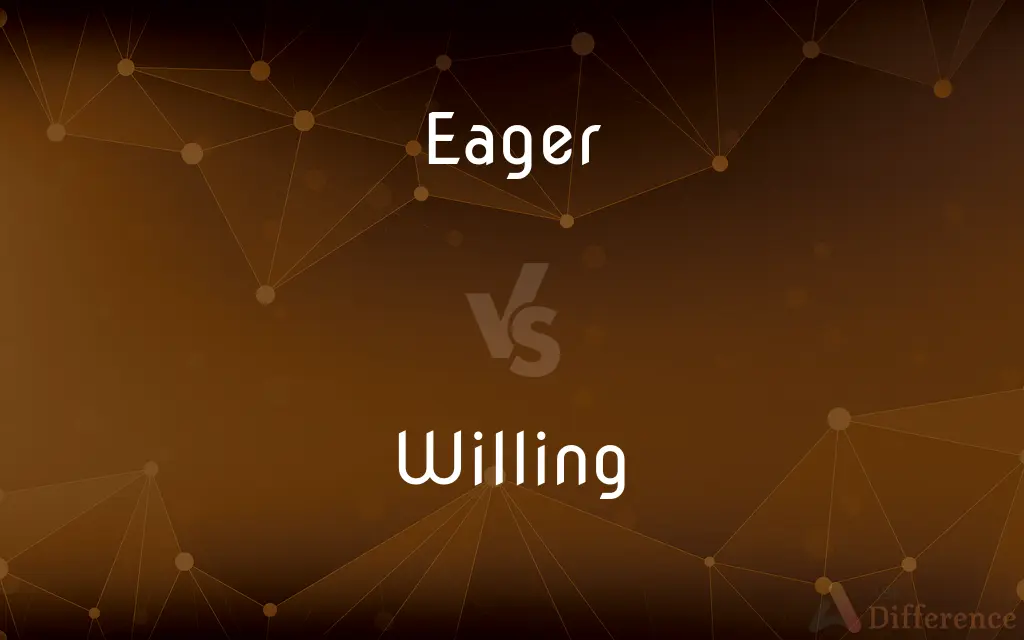Eager vs. Willing — What's the Difference?
By Tayyaba Rehman — Updated on October 25, 2023
Eager denotes enthusiastic desire; Willing indicates a ready consent or agreement without necessarily being enthusiastic.

Difference Between Eager and Willing
Table of Contents
ADVERTISEMENT
Key Differences
Eager and Willing, both suggest an inclination towards doing something, but their intensity and context differ. Eager implies a keen enthusiasm or fervent desire to do or have something. It's that bubbling excitement when you're looking forward to an event. Willing, however, suggests a more passive readiness or consent to do something, not always paired with excitement.
If someone is eager to attend a concert, they're probably anticipating it with great enthusiasm, counting down the days. Contrastingly, if they're willing to attend, it might mean they're okay with going but don't possess that burning desire. Their attendance might be out of obligation or simply because they have no reservations against it.
Being eager often entails a sense of impatience, a palpable enthusiasm. It's the child on Christmas morning or a fan before a movie premiere. On the flip side, being willing signifies an acceptance or a lack of opposition. It's the friend who says, "Sure, I'll come if you want me to," rather than, "I can't wait to come!"
In essence, while both words indicate a positive inclination towards an action, eager carries a sense of excitement and impatience, whereas willing suggests a calmer, more measured consent.
Comparison Chart
Primary Function
Adjective
Adjective
ADVERTISEMENT
Intensity
High (enthusiastic desire)
Moderate (ready consent)
Emotion Involved
Often enthusiastic
Neutral or passive
Usage Example
Eager to learn
Willing to help
Implication
Implies anticipation and excitement
Implies acceptance without necessarily being enthusiastic
Compare with Definitions
Eager
Ardently desirous.
They were eager for success.
Willing
Ready to consent or accept.
She was willing to listen to his side of the story.
Eager
Hasty or earnest in pursuit.
Eager beavers finishing the project.
Willing
Acting or ready to act gladly.
He was always a willing participant in class discussions.
Eager
Characterized by keen desire.
He's an eager student always asking questions.
Willing
Not objecting or reluctant.
I'm willing if you are.
Eager
Enthusiastically impatient.
She was eager to start her new job.
Willing
Given or done freely and readily.
He gave a willing hand to those in need.
Eager
Marked by spirited interest.
He showed an eager face at the news.
Willing
Disposed or inclined; prepared.
The dog was always willing to play fetch.
Eager
Strongly wanting to do or have something
The man was eager to please
Young intellectuals eager for knowledge
Willing
Disposed or inclined; prepared
I am willing to overlook your mistakes.
Eager
Having or showing keen interest, intense desire, or impatient expectancy. See Usage Note at anxious.
Willing
Acting or ready to act gladly; eagerly compliant
A willing worker.
Eager
(Obsolete) Tart; sharp; cutting.
Willing
Done, given, or accepted voluntarily or ungrudgingly.
Eager
Variant of eagre.
Willing
Ready to do something that is not (can't be expected as) a matter of course.
If my boyfriend isn't willing to change his drinking habits, I will split up with him.
Eager
See tidal bore.
Willing
The execution of a will.
Eager
Desirous; keen to do or obtain something.
Stacey is very eager to go cycling this weekend.
The hounds were eager in the chase.
I was eager to show my teacher how much I'd learned over the holidays.
You stayed up all night to get to the front of the queue. You must be very eager to get tickets.
Willing
Present participle of will
Eager
(comptheory) Not employing lazy evaluation; calculating results immediately, rather than deferring calculation until they are required.
An eager algorithm
Willing
Free to do or to grant; having the mind inclined; not opposed in mind; not choosing to refuse; disposed; not averse; desirous; consenting; complying; ready.
Felix, willing to show the Jews a pleasure, left Paul bound.
With wearied wings and willing feet.
[Fruit] shaken in August from the willing boughs.
Eager
(dated) Brittle; inflexible; not ductile.
Willing
Received of choice, or without reluctance; submitted to voluntarily; chosen; desired.
[They] are held, with his melodious harmony,In willing chains and sweet captivity.
Eager
Sharp; sour; acid.
Willing
Spontaneous; self-moved.
No spouts of blood run willing from a tree.
Eager
Sharp; keen; bitter; severe.
Willing
The act of making a choice;
Followed my father of my own volition
Eager
Alternative form of eagre(tidal bore).
Willing
Disposed or inclined toward;
A willing participant
Willing helpers
Eager
Sharp; sour; acid.
Willing
Not brought about by coercion or force;
The confession was uncoerced
Eager
Sharp; keen; bitter; severe.
Willing
Disposed or willing to comply;
Someone amenable to persuasion
The spirit indeed is willing but the flesh is weak
Eager
Excited by desire in the pursuit of any object; ardent to pursue, perform, or obtain; keenly desirous; hotly longing; earnest; zealous; impetuous; vehement; as, the hounds were eager in the chase.
And gazed for tidings in my eager eyes.
How eagerly ye follow my disgraces!
When to her eager lips is broughtHer infant's thrilling kiss.
A crowd of eager and curious schoolboys.
Conceit and grief an eager combat fight.
Eager
Brittle; inflexible; not ductile.
Gold will be sometimes so eager, as artists call it, that it will as little endure the hammer as glass itself.
Eager
Same as Eagre.
Eager
A high wave (often dangerous) caused by tidal flow (as by colliding tidal currents or in a narrow estuary)
Eager
Having or showing keen interest or intense desire or impatient expectancy;
Eager to learn
Eager to travel abroad
Eager for success
Eager helpers
An eager look
Eager
Marked by active interest and enthusiasm;
An avid sports fan
A great walker
An eager beaver
Common Curiosities
Is someone who is "willing" always "eager"?
No. A person can be willing to do something without being eager or enthusiastic about it.
Is "eager" always a positive trait?
Generally, but being overly eager might be seen as impulsive or hasty in some contexts.
Can "eager" refer to a negative desire?
Yes, context matters. One can be "eager for revenge."
How does "willingness" relate to "willing"?
"Willingness" is the noun form, indicating the quality of being ready or inclined to do something.
Is someone who's "willing" always agreeable?
Generally, yes, as "willing" implies a readiness or lack of resistance.
Can you be "eager" but not "willing"?
Yes. One might be eager to try skydiving but not willing due to fear.
Which word has a stronger intensity?
"Eager" has a stronger intensity as it denotes enthusiasm.
If someone is "eager to please," are they always "willing to do anything"?
Not always, but they are very enthusiastic about making someone happy or satisfied.
Can "eager" and "willing" be used interchangeably?
Not always. While both indicate a positive inclination, "eager" suggests enthusiasm, while "willing" implies readiness or consent.
Can objects be "eager"?
Not literally, but metaphorically, yes. E.g., "The engine was eager to roar."
Is "willing" more passive than "eager"?
Yes, "willing" is generally more passive, suggesting consent without necessarily being enthusiastic.
Does "willing" always mean you want to do something?
No, it means you're ready to do it, not necessarily that you desire it.
Can animals be described as "eager" or "willing"?
Yes, e.g., "The dog was eager to play" or "The horse was willing to be led."
Can you be "unwilling" but "eager"?
It's contradictory. One might be eager about the idea but unwilling due to other factors.
How can I tell if someone's consent is out of eagerness or willingness?
Context and tone. Eagerness often shows enthusiasm, while willingness might be more reserved.
Share Your Discovery

Previous Comparison
Reside vs. Live
Next Comparison
Bedside vs. BedsiteAuthor Spotlight
Written by
Tayyaba RehmanTayyaba Rehman is a distinguished writer, currently serving as a primary contributor to askdifference.com. As a researcher in semantics and etymology, Tayyaba's passion for the complexity of languages and their distinctions has found a perfect home on the platform. Tayyaba delves into the intricacies of language, distinguishing between commonly confused words and phrases, thereby providing clarity for readers worldwide.














































